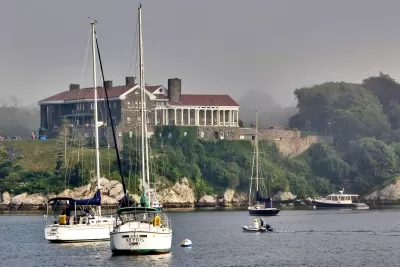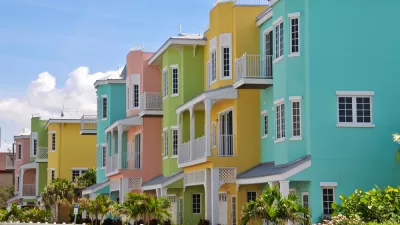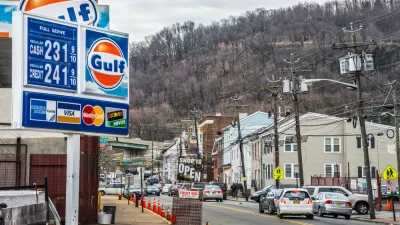Public comments were largely favorable regarding the 12-state program intended to reduce transportation emissions by using a cap-and-invest system, but governors are cautious due to an expected effect on gas prices.

The Transportation and Climate Initiative, which aims to reduce greenhouse gas emissions from the transportation sector in 12 Northeast and Mid-Atlantic states and the District of Columbia, has received over 8,300 comments during the last few months, "with 91% of those comments showing support of the policy, according to the Our Transportation Future (OTF) coalition," report Katie Pyzyk and Kristin Musulin for Smart Cities Dive on March 2.
The coalition is composed largely of environmental and public interest groups that are supportive of the initiative's goal of reducing transportation emissions, responsible for over one-third of emissions in the region.
As former Maryland Gov. Paris Glendening noted in his Washington Post opinion (posted here) last month that was highly supportive of the initiative as a means to reduce auto-dependency, Feb. 28 was the cutoff for comments.
Reducing transportation emissions means adding to gasoline and diesel costs
While the comments from the public were overwhelmingly favorable, the ultimate decision as to whether to join the program will be left to elected leaders of Connecticut, Delaware, Maine, Maryland, Massachusetts, New Hampshire, New Jersey, New York, Pennsylvania, Rhode Island, Vermont, Virginia and the District of Columbia. Michael Casey of the Associated Press reported in January that "Northeast governors were slow to embrace the regional climate pact."
As noted in a related post in December, "New Hampshire has already pulled out of the effort, with Gov. Chris Sununu posting on twitter [Dec. 17] that his state 'would not force Granite Staters to pay more for their gas just to subsidize other states’ crumbling infrastructure.'”
Koch network activated
In an opinion published last month in The New York Times on Feb. 26 that asked the key question on the initiative, "Would You Pay Higher Gas Prices to Slow the Climate Crisis?"
Gillis exposes the opposition to the initiative that may contribute to the governors' reluctance to endorse the plan –a "climate disinformation network founded by Charles Koch and his brother David, who died last year."
That network and allied groups are working to kill [pdf] the measure, with at least 18 right-leaning organizations in the region — some of them merely Koch front groups — blitzing newspapers with letters and cajoling motorists to badger politicians to stop the effort.
In fact, Pyzyk and Musulin in their Smart Cities post (source article) pointed to one such letter to the editor of The Washington Post penned by Christian N. Braunlich, president of the Thomas Jefferson Institute for Public Policy, who wrote in response to the Glendening opinion:
[Glendening] failed to mention that the carbon car tax imposed by the Transportation and Climate Initiative (TCI) would add at least 17 cents per gallon to gasoline and diesel (rising in future years) and ration that fuel by imposing annual reductions in the amount of fuel permitted to be sold — two facts necessary for an honest conversation.
While it is true that Glendening didn't mention how the transportation investments would be funded other than identifying the mechanism as a "regional cap-and-invest system to reduce carbon emissions from the transportation sector," clearly Braunlich is being deceptive when he states that fuel would be "rationed." The cap-and-invest program using market principles, not mandates, to reduce carbon emissions. Our Transportation Future explains:
How would cap-and-invest work? First, the region would set a cap, or limit on pollution. The cap would decline each year in proportion to our region’s climate goals. Big polluters, such as oil companies, would be required to purchase allowances based on the pollution they cause from a limited pool made available under the cap.
Fuel would not be rationed, but those oil companies would likely pass on the cost of the carbon allowances to consumers, resulting in increased fuel prices, which is giving wary governors cause for concern.
"Gov. Phil Scott [R-Vt.] has said he'll be skeptical of signing on to any plan that increases the cost of gasoline in Vermont," reported Peter Hirschfeld for Vermont Public Radio in December [4-minute audio version is recommended].
Scott is no climate skeptic. As noted in a June 2017 post, "Let the Climate Resistance Begin," shortly after President Trump initiated the withdrawal from the Paris climate agreement, Scott was one of the few Republican governors who joined the Climate Alliance, committing his state to the U.S. goal in the Paris agreement of reducing emissions 26-28 percent from 2005 levels reductions.
Related in Planetizen:
-
Smart Growth America Promotes the Transportation and Climate Initiative, February 24, 2020,
-
Learning the Wrong Lessons From France's Yellow Vest Movement, January 3, 2019 [Justin Gillis op-ed]
-
An East Coast Cap-and-Invest Approach to Reducing Transportation Emissions, December 20, 2018
FULL STORY: Transportation & Climate Initiative sees 'overwhelming support' of cap-and-invest plan

Alabama: Trump Terminates Settlements for Black Communities Harmed By Raw Sewage
Trump deemed the landmark civil rights agreement “illegal DEI and environmental justice policy.”

Planetizen Federal Action Tracker
A weekly monitor of how Trump’s orders and actions are impacting planners and planning in America.

The 120 Year Old Tiny Home Villages That Sheltered San Francisco’s Earthquake Refugees
More than a century ago, San Francisco mobilized to house thousands of residents displaced by the 1906 earthquake. Could their strategy offer a model for the present?

In Both Crashes and Crime, Public Transportation is Far Safer than Driving
Contrary to popular assumptions, public transportation has far lower crash and crime rates than automobile travel. For safer communities, improve and encourage transit travel.

Report: Zoning Reforms Should Complement Nashville’s Ambitious Transit Plan
Without reform, restrictive zoning codes will limit the impact of the city’s planned transit expansion and could exclude some of the residents who depend on transit the most.

Judge Orders Release of Frozen IRA, IIJA Funding
The decision is a victory for environmental groups who charged that freezing funds for critical infrastructure and disaster response programs caused “real and irreparable harm” to communities.
Urban Design for Planners 1: Software Tools
This six-course series explores essential urban design concepts using open source software and equips planners with the tools they need to participate fully in the urban design process.
Planning for Universal Design
Learn the tools for implementing Universal Design in planning regulations.
Clanton & Associates, Inc.
Jessamine County Fiscal Court
Institute for Housing and Urban Development Studies (IHS)
City of Grandview
Harvard GSD Executive Education
Toledo-Lucas County Plan Commissions
Salt Lake City
NYU Wagner Graduate School of Public Service





























